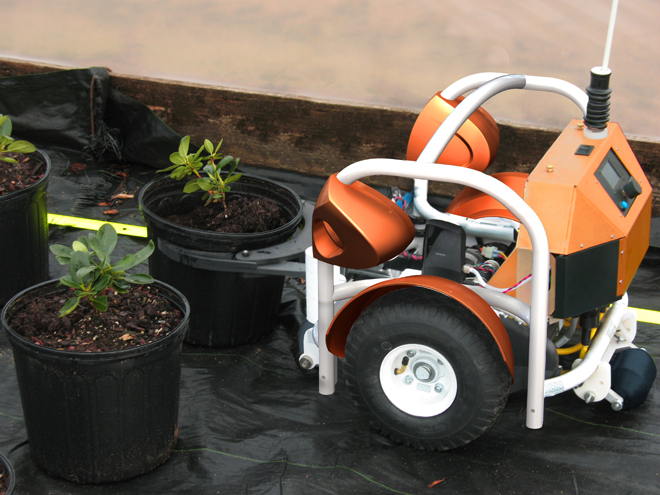You've heard of the Roomba, right? That cute little robot vacuum that you can set up in your family room or bedroom, hit the button, and watch it smoothly and quietly scurry about the room vacuuming up your potato chip crumbs and the excess from Fido's winter coat while you can rest on the sofa, perhaps snuggled up with a good book and wearing your Forever Lazy. The Droid can help you with your hibiscus
The Droid can help you with your hibiscus
The Roomba, at least the idea of the Roomba is awesome, right? I mean who would not want to trade the tedious chore of vacuuming for just about any of the alternative activities you could choose from if you were freed from the weekly waltz with the trusty Hoover or Dyson? Set up the Roomba, then kick back. Or work. Or talk to one of your kids. Or more likely, post a status update on Facebook that says something like, 'Man, the Roomba is awesome.' Which all your friends will interpret as, 'I can't believe that moron is Facebooking about his Roomba again.' Or, 'What a dork. I bet he's sitting on the sofa in a Forever Lazy.'
Jokes aside, we'd all probably agree that technologies like the Roomba have clear and obvious benefit - they save us time, effort, and automate an incredibly dull and low-skill type of effort, that allow us to engage in more interesting and productive things. And as a plus, there is a whole ecosystem that has to design, build, ship, sell, support, and maintain these devices. This creates jobs, (although in fairness at some cost of the loss of similar in the 'traditional' vacuum industry), but overall it would hard to feel worried or threatened if suddenly there was a Roomba in every home.
The parallels to the domesticated Roomba were obvious when I read this Wired.com piece: 'These May Be the Droids Farmers Are Looking For'. The story, about the testing of a more advanced, more capable Roomba-like robot that can help nursery owners organize, sort, and transport large numbers of plants and trees was interesting to me not so much for the pure technological angle, but rather for the economic impetus driving the grower's needs for this kind of technology. From the piece on Wired:
Massachusetts startup Harvest Automation is beta testing a small mobile robot that it’s pitching to nurseries as the solution to their most pressing problem: a volatile labor market.
In today’s human-tended nurseries, immature potted trees and shrubs arrive at nurseries by truck and are offloaded onto the ground. Teams of migrant workers — undocumented for the most part — spread the plants out one by one following markers outlining a grid. When the plants are ready to be shipped out later in the season, workers reverse the process to group the plants for loading onto trucks. “We’ve recognized the need for robotics in the nursery industry for moving pots because it’s one of our highest concentrations of labor use,” said Tom Demaline, president of Willoway Nurseries, Inc. in Avon, Ohio
So what you might be thinking. The history of the industrial revolution, heck the past 200 years of capitalism is essentially a story of technological invention and advancement, often resulting in the displacement of workers that are found to be either too expensive, less productive, and more of a pain in the neck to manage, (or some combination thereof), than their robot replacements.
But the farm robot story is I think because of the larger economical and political factors at play that are serving to catalyze and drive further development. The farming jobs that this new family of robots usurps were typically ones held by immigrants, often undocumented ones. With increasing enforcement of existing immigration laws, and the enacting of new, even stricter ones like in Alabama, many farmers and farm related businesses find themselves in a crunch. Their previous supply of labor has left or has been frightened away, local and legal replacements seem not to be available or willing, leaving this new robotic future as one potential way out of their bind.
Which is not necessarily a bad thing. There's a job that has to be done. The labor market (for whatever reason), can't fulfill the need, so a new technology develops to close the gap. But the problem is, for all the 'Farmer Roomba' design, development, and manufacturing jobs, (which probably will be outsourced), they will never amount to the many hundreds and thousands of farm laborer jobs that are going to disappear. The technology will eventually allow the same amount of work to be done, faster, cheaper, with less errors, and with far, far less human effort, labor, and of course wages.
This equation works fantastically well for the vacuum example, like I said before, the trade-off usually involves you lounging on the sofa while the Roomba works. I have my doubts that any of the farm workers replaced by the 'Droids' are chilling in their Forever Lazy's right now.